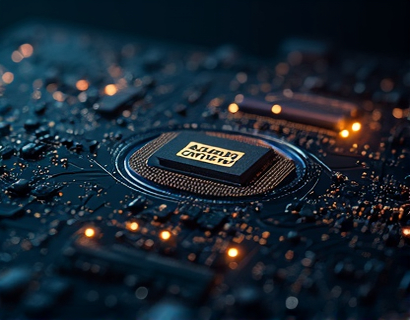Smart Contract Solutions for Pegged Token Creation and Seamless UCASH Exchange in Decentralized Finance
In the rapidly evolving landscape of decentralized finance, the integration of smart contract technology has emerged as a pivotal innovation, particularly in the creation of stable digital currencies pegged to leading tokens and the facilitation of seamless bidirectional trading. This article delves into the mechanisms and benefits of using smart contracts to create pegged tokens and enhance the stability and flexibility of DeFi ecosystems. By focusing on the technical and practical aspects, this piece aims to educate cryptocurrency enthusiasts and DeFi innovators on how these solutions are reshaping the future of digital finance.
Smart contracts, self-executing contracts with the terms of the agreement directly written into code, offer a secure and transparent way to manage complex financial operations. In the context of DeFi, these contracts play a crucial role in the creation of stablecoins and pegged tokens, which are digital currencies designed to maintain a stable value relative to a specific asset, such as the US dollar or a leading cryptocurrency like UCASH.
Creating Stablecoins with Smart Contracts
The process of creating a stablecoin using smart contracts begins with the definition of the token's parameters, including its name, symbol, and the asset it is pegged to. The smart contract is programmed to maintain the peg by automatically adjusting the supply of the token based on market conditions. This is typically achieved through an algorithmic approach or by holding collateral that can be liquidated to buy or sell the pegged asset to maintain the desired value.
One of the key advantages of using smart contracts for stablecoin creation is the elimination of intermediaries. Traditional stablecoin issuance often involves a central authority or a trust, which can be a point of failure or manipulation. Smart contracts, running on blockchain networks, ensure that the rules are enforced transparently and immutably, reducing the risk of fraud and increasing trust among users.
Pegging to UCASH: A Case Study
UCASH, a leading cryptocurrency, has been at the forefront of adopting smart contract solutions for stablecoin creation. By leveraging smart contracts, UCASH enables the issuance of pegged tokens that maintain a stable value against UCASH. This peg is maintained through a combination of algorithmic adjustments and collateral management, ensuring that the token's value remains consistent even in volatile market conditions.
The smart contract for UCASH-pegged tokens is designed to automatically buy or sell UCASH to maintain the peg. For instance, if the token's price starts to deviate from the peg, the smart contract will trigger transactions to buy or sell UCASH to bring the price back in line. This mechanism ensures that the token remains a reliable store of value and medium of exchange.
Technical Implementation
The technical implementation of a UCASH-pegged token involves several key components. First, the smart contract is deployed on a blockchain platform, such as Ethereum, which supports complex contract functionalities. The contract includes variables to store the current price of UCASH, the amount of UCASH held as collateral, and the total supply of the pegged token.
The contract also contains functions for peg adjustment, collateral management, and token issuance and redemption. The peg adjustment function calculates the necessary amount of UCASH to buy or sell based on the current market price and the desired peg ratio. The collateral management function ensures that the contract holds enough UCASH to cover any potential losses and maintains the stability of the peg.
Token holders can interact with the smart contract to buy or sell the pegged token for UCASH. When a user wants to buy the token, the contract checks if the current price is below the peg and, if so, initiates a transaction to purchase UCASH. Conversely, if the user wants to sell the token and the price is above the peg, the contract sells UCASH to maintain the peg.
Seamless Bidirectional Trading
One of the most significant benefits of using smart contracts for pegged token creation is the facilitation of seamless bidirectional trading. Users can easily convert the pegged token back and forth between the stablecoin and the underlying asset without the need for intermediaries. This bidirectional functionality enhances the liquidity and usability of the token, making it a more attractive option for traders and investors.
The smart contract ensures that the trading process is transparent and secure. Each transaction is recorded on the blockchain, providing a tamper-proof ledger of all trades. This transparency builds trust among users and reduces the risk of disputes or fraudulent activities.
User Experience
The user experience is a critical aspect of any DeFi solution. Smart contracts for pegged tokens are designed to be user-friendly, with intuitive interfaces and straightforward processes. Users can interact with the contract through decentralized applications (dApps) built on the same blockchain platform, allowing for a seamless and secure trading experience.
Moreover, the automation provided by smart contracts reduces the complexity and friction associated with traditional trading methods. Users do not need to rely on third-party exchanges or deal with counter-party risks, as the smart contract executes trades directly and efficiently.
Enhancing Decentralized Finance
The integration of smart contract solutions for pegged token creation and bidirectional trading significantly enhances the DeFi ecosystem. By providing stable and reliable digital currencies, these solutions address one of the key challenges in DeFi: volatility. Stablecoins and pegged tokens offer a stable store of value and a reliable medium of exchange, making DeFi more accessible and appealing to a broader audience.
Furthermore, the use of smart contracts promotes financial inclusion by reducing barriers to entry. Users from any part of the world can participate in DeFi protocols without the need for traditional financial institutions. This democratization of finance is a significant step towards creating a more inclusive and equitable global economy.
Security and Trust
Security is paramount in DeFi, and smart contracts play a crucial role in ensuring the integrity of financial operations. The immutable nature of blockchain technology and the transparent execution of smart contracts minimize the risk of manipulation and fraud. However, it is essential to note that smart contracts are only as secure as their code. Rigorous testing and auditing are necessary to identify and mitigate potential vulnerabilities.
Reputable DeFi platforms and developers invest in comprehensive security measures, including code audits by independent experts, to ensure the reliability of their smart contracts. This commitment to security fosters trust among users and contributes to the overall stability of the DeFi ecosystem.
Future Prospects
The future of DeFi is bright, with smart contract solutions for pegged token creation and bidirectional trading poised to play a central role. As blockchain technology continues to evolve, we can expect more sophisticated and efficient smart contracts that offer even greater stability and flexibility.
One area of development is the integration of decentralized oracles, which provide real-time market data to smart contracts. This integration can further enhance the accuracy of peg adjustments and improve the responsiveness of the system to market changes. Additionally, the exploration of cross-chain interoperability will enable pegged tokens to be used across different blockchain networks, expanding their utility and reach.
Another promising development is the incorporation of governance mechanisms, allowing token holders to participate in decision-making processes related to the smart contract's parameters and upgrades. This governance model can foster community-driven innovation and ensure that the protocol remains aligned with user needs and market conditions.
Conclusion
Smart contract solutions for pegged token creation and seamless bidirectional trading represent a significant advancement in DeFi. By providing secure, efficient, and user-friendly tools, these solutions are transforming the landscape of digital finance. As the technology matures and adoption grows, we can expect to see even more innovative applications that further enhance the stability and accessibility of decentralized financial systems.
For cryptocurrency enthusiasts and DeFi innovators, embracing these smart contract solutions is not just an opportunity but a necessity. By leveraging the power of blockchain and smart contracts, the future of finance is becoming more decentralized, transparent, and inclusive.










































